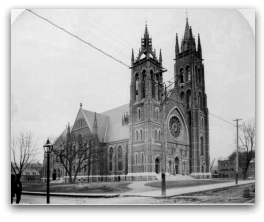Main menu
- ‘Abdu’l-Bahá’s Journey
- World Peace
- Stopping Racism in America
- Empowerment of Women
- More Principles...
- Prayer for America
At the end of His talk at the Methodist Church a judge repeatedly expressed his desire to become a Bahá’í

‘Abdu’l-Bahá went to the vestry [of the Methodist Church] where a number of ministers came to greet Him with such reverence and humility that it was really something to be seen. He then went into the auditorium and took a seat on the platform. The minister welcomed Him by motioning the audience to rise, which they immediately did to show their respect. The minister then made an introductory speech about the world’s apathy to the commandments of the Gospel and the urgent need for laws of peace and harmony among the peoples of the West. Finally he urged the audience to listen carefully to the address and the new teachings given by ‘Abdu’l-Bahá.
The Master stood before the audience and spoke about the continuity of the Divine Bounties, the power and majesty of the Kingdom of God and these wonderful teachings. The audience was awakened to the Faith to such a degree that a judge named Mr. Riger, who had previously heard of the Master and had come for the first time this evening to hear Him speak, stood and said, ‘Some have imagined that the succession of the Prophets and the bounties of God were limited. But tonight we have heard with our own ears these divinely ordained teachings from an Eastern prophet who is the successor of the Prophets of God. We will never forget his message. There is no doubt that these teachings of universal peace, the oneness of humanity and the distribution of wealth are in complete accord with the principles of economic law, the equality of rights and the adoption of one universal language. These are the basic principles for the progress of the world of humanity.’ The minister then stood and said, ‘It is an error to think that the West has attained perfection and that the East has no bounties or teachings to offer to the West. ‘Abdu’l-Bahá has said many things which we have not heard before or understood
The Master then chanted a prayer and publicly thanked the judge. Later, in the vestry, the clergymen were so deferential in His presence, they could not find words to express their gratitude. Of particular note was the judge, who repeatedly expressed his desire to become a Bahá’í.








